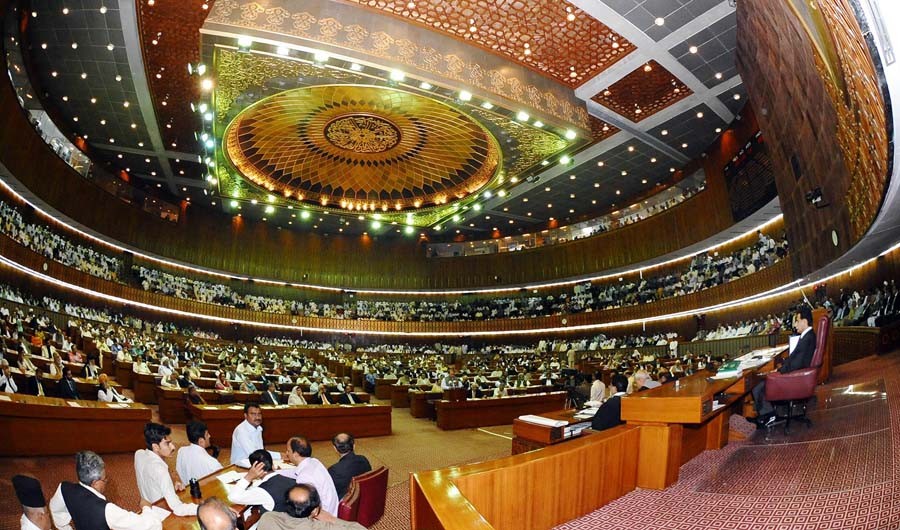
Politics in parliament is alive and well but not necessarily clean

In a surprise move, the Senate passed the amended Election Bill 2017 on Sept 22 amid walkouts and protests by opposition parties.
Many experts believe this was a calculated move by the ruling Pakistan Muslim League Nawaz (PML-N) that is in a minority in the upper house of the parliament. The PML-N won by one vote, with the help of Muttahida Qaumi Movement (MQM) and members of Federally Administered Tribal Areas (Fata).
The bill, soon to be approved by the National Assembly, has a clause that will allow Nawaz Sharif to regain chairmanship of his party. Following his disqualification on July 28, Sharif was stripped of PML-N chairmanship under the Political Parties Order 2002.
In his press conference on the day of his appearance in the NAB court in Islamabad, Sharif vowed to continue his struggle for civilian supremacy in the country. With a depressed look and reading from a paper, he said fleeing from the courts was not his way. He called the trial against him unfair and fabricated by "certain elements" to oust him from power. He left the press conference without taking questions from the mediapersons.
A day later, he reportedly held a private meeting with the country’s real estate tycoon Malik Riaz, who is known for acting as a middleman between the civil and military elite.
PML-N leader Khawaja Saad Rafique in a series of tweets thanked senators and their respective parties for supporting the bill.
MQM Senator Mian Attique Sheikh, who voted in favour of the bill, said he has no remorse for casting his vote.
The timing of the bill, just two days before the return of Nawaz Sharif from London to appear before the National Accountability Court (NAB) to face corruption references against him, has raised much concern.
Interestingly, the main opposition parties -- PPP and PTI -- overlooked this clause in the much-debated bill. Even the PPP failed to pass its suggested amendment in the house which, presented by Senator Aitzaz Ahsan, stated that any person ineligible to hold office as an MNA is ineligible to hold the position of head of a political party.
The bill will now go back to the National Assembly for approval. It will become a law after presidential assent.
Though the PPP, MQM, and PTI have issued show-cause notices to their absent members for this humiliation in the Senate, political analysts like Arif Nizami believe this bill is a message to the opposing parties -- that they too may benefit from it in the future. "Chairperson and co-chairperson of the PPP are also unelected and running the house through a supplementary PPP-Parliamentarian (PPPP). Also, the Supreme Court of Pakistan is hearing three cases against PTI Chief Imran Khan along with a separate contempt notice against him in the Election Commission of Pakistan. MQM-London’s head is also not a member of the parliament."
To Nizami, the passing of the bill is a calculated move not just by the PML-N but by all the parties combined. "If we see the tradition in the subcontinent, even Mahatma Gandhi was not a member of the parliament."
Analyst Tahir Mehdi thinks it does not matter whether a political leader is in the assembly or not. "The real thing is his popular presence on the political scene," he says, continuing, "The passing of the election bill in the Senate is an obvious message that Nawaz Sharif is still enjoying political influence and strength and will continue to do so."
The Supreme Court Bar Association has vowed to move the Supreme Court against this clause in the Election Bill 2017 in days to come. However, many believe this may not translate into anything practical.
Elsewhere in the National Assembly, the PTI is lobbying for the removal of Khursheed Shah as the opposition leader. The PPP, the biggest opposition party with 47 seats, has held the opposition leader’s position for the past four years.
The removal of the opposition leader will impact the appointment of chairman NAB, chief ECP and some other key slots that the government fills in consultation with the opposition leader.
"Presently, it seems that the government is strong and chances of change in opposition leader are also less but the situation in next few weeks will further indicate the strength of these parties," Tahir Mehdi thinks. "If the opposition’s political moves accelerate, possibility of early elections cannot be ignored."